Posting an end of year round up at the end of January might seem a bit daft, but I’m already one step ahead of last year, when I posted my end of year reflection in February!
The beginning of the year was a succession of real highs and lows. UCU entered a long phase of industrial action which came at a particularly challenging time for me as January and February is usually when I’m preparing for Open Education Week and the OER Conference. However I also took some time out for a trip to New York with friends, which turned out to be one of the high points of my year.
Open Education Week
For Open Education Week we ran a webinar that celebrated 10 years of open course development at the University of Edinburgh and shared the open course creation workflow that we’ve developed and refined over the years.
OER23 Conference
It was great to see the OER Conference returning to Scotland in March when it was hosted by UHI in Inverness. Inverness is a place that is very close to my heart as it’s the main city in the Highlands and it’s also were we used to go on holiday when I was a kid. Inverness is still a stopping off point on the journey home when I go to visit family in Stornoway so I had a slightly weird feeling of nostalgia and home-sickness while I was there, it was odd being in Inverness and not traveling on further north and west.
One of the themes of this years conference was Open Scotland +10 and Joe Wilson and I ran a number of sessions including a pre-conference workshop and closing plenary to reflect on how the open education landscape in Scotland has evolved over the last decade, and to discuss potential ways to advance open education across all sectors of Scottish education.
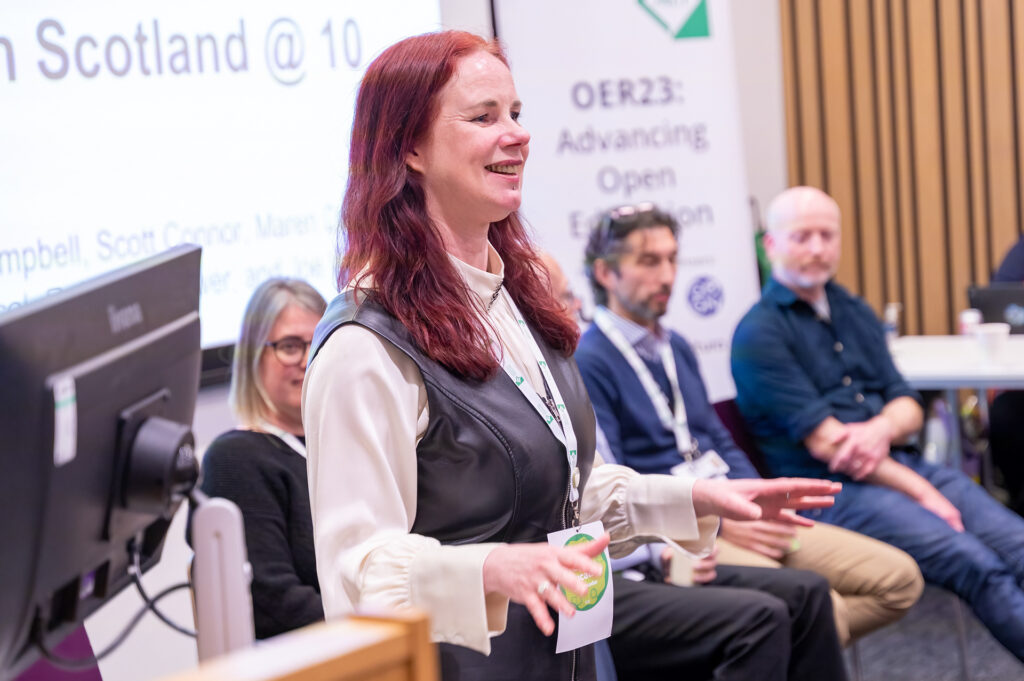
Open Scotland Plenary Panel by Tim Winterburn.
Here, the closing Panel Plenary session
Generative AI
Like many working in technical, educational and creative sectors I found it impossible to ignore the discourse around generative AI, though I hope I managed to avoid getting swept up in the hype and catastrophising. In July I wrote an off-the-cuff summary of some of the many ethical issues related to generative AI and LLMs that are becoming increasingly hard to ignore: Generative AI – Ethics all the way down. I appreciated having an opportunity to revisit these issues again at the end of the year when I joined the ALT Winter Summit on Ethics and Artificial Intelligence which provided much food for thought. Helen Beetham’s keynote Whose Ethics? Whose AI? A relational approach to the challenge of ethical AI was particularly thoughtful and thought provoking.
Student Interns
Much of the summer was taken up with recruiting and managing our Open Content Curator student interns. It’s always a joy working with our interns, their energy and enthusiasm is endlessly inspiring, and this year’s interns, August and Mayu, were no exception. I suggested it might be fun for them to interview each other about their experience of working with the OER Service and, with the help of our fabulous Media Team, they produced this lovely video.
I was delighted when August and Mayu were shortlisted for the Student Employee of the Year Award in Information Services Group’s Staff Recognition Awards, in acknowledgement of their outstanding work with the OER Service and their wider contribution to ISG and the University.
Their Finest Hour
The OER Service welcomed another student intern in the summer, Eden Swimer, who joined us to help run a digital collection day as part of the University of Oxford’s Their Finest Hour, a National Lottery Heritage funded project at the University of Oxford, which is collecting and preserving the everyday stories and objects of the Second World War. Organising and running the digital collection day proved to be a huge undertaking and we couldn’t have done it without the help of 26 volunteers from across ISG and beyond who committed so much time and energy to the project.
The digital collection day took place in Rainy Hall, New College at the end of November and it was a huge success. Over 100 visitors attended and volunteers recorded over 50 interviews and took thousands of photographs, all of which will be uploaded to an open licensed archive that will be launched by the University of Oxford in June this year. It was a deeply moving event, many of the stories recorded were truly remarkable and the visitors clearly appreciated having the opportunity to share their families stories. In some cases these stories were being told by the last surviving relatives of those who had witnessed the historic events of WW2 and there was a real sense of preserving their experiences for posterity.
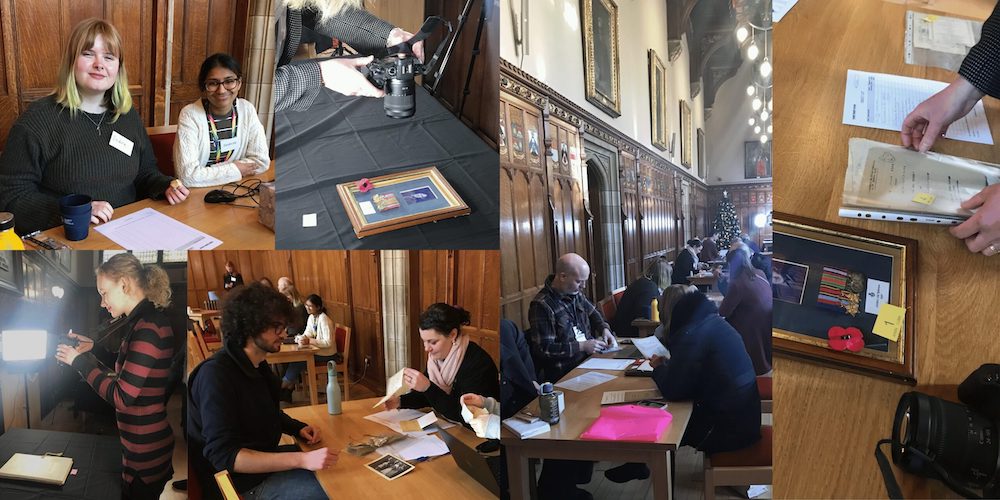
Their Finest Hour digital collection day by Fiona Hendrie
The collection day was covered by STV and you can see a short clip of their news item here: Second World War memories to be preserved at university collection day
Publications
It was a privilege to work with co-authors Frances Bell, Lou Mycroft, Guilia Forsythe and Anne-Marie Scot to contribute a chapter on the “FemEdTech Quilt of Care and Justice in Open Education” to Catherine Cronin and Laura Czerniewicz’s timely and necessary Higher Education for Good: Teaching and Learning Futures.
 “Quilting has always been a communal activity and, most often, women’s activity. It provides a space where women are in control of their own labour: a space where they can come together to share their skill, pass on their craft, tell their stories, and find support. These spaces stand outside the neoliberal institutions that seek to appropriate and exploit our labour, our skill, and our care. The FemEdTech-quilt assemblage has provided a space for women and male allies from all over the world to collaborate, to share their skills, their stories, their inspiration, and their creativity. We, the writers of this chapter, are five humans who each has engaged with the FemEdTech Quilt of Care and Justice in Open Education in different ways, and who all have been active in the FemEdTech network.”
“Quilting has always been a communal activity and, most often, women’s activity. It provides a space where women are in control of their own labour: a space where they can come together to share their skill, pass on their craft, tell their stories, and find support. These spaces stand outside the neoliberal institutions that seek to appropriate and exploit our labour, our skill, and our care. The FemEdTech-quilt assemblage has provided a space for women and male allies from all over the world to collaborate, to share their skills, their stories, their inspiration, and their creativity. We, the writers of this chapter, are five humans who each has engaged with the FemEdTech Quilt of Care and Justice in Open Education in different ways, and who all have been active in the FemEdTech network.”
I was also invited to submit a paper to a special open education practice edition of Edutec Journal. Ewan McAndrew, Melissa Highton and I co-authored a paper on “Supporting open education practice: Reflective case studies from the University of Edinburgh.”
“This paper outlines the University of Edinburgh’s long-running strategic commitment to supporting sustainable open education practice (OEP) across the institution. It highlights how the University provides underpinning support and digital capability for OEP through central services working with policy makers, partners, students, and academics to support co-creation and active creation and use of open educational resources to develop digital literacy skills, transferable attributes, and learning enhancement. We present a range of case studies and exemplars of authentic OEP evidenced by reflective practice and semi-structured ethnographic interviews, including Wikimedia in the Curriculum initiatives, open textbook production, and co-creation of interdisciplinary STEM engagement resources for schools. The paper includes recommendations and considerations, providing a blueprint that other institutions can adopt to encourage sustainable OEP. Our experience shows that mainstreaming strategic support for OEP is key to ensuring inclusive and equitable quality education and promoting lifelong learning opportunities for all.”
Writing this paper was an interesting experience as Edutec is a research journal that expects evidence to be presented in a very particular way. As a service division, we support practice rather than undertaking academic research, so the case studies we present are based on authentic reflective practice rather than empirical research, however it was useful to think about this practice from a different perspective.
Wikimedia UK
In July I was awarded Honorary Membership of Wikimedia UK in recognition of my contribution to the work of the charity during my six years as a Trustee. When my term as a trustee came to an end, I was hoping that I’d have more time to contribute to the Wikimedia projects. That hasn’t quite happened, I didn’t manage to do any Wikipedia editing in 2023, but I did enjoy taking part in Wiki Loves Monuments again. I also digitised some pictures I took of the Glasgow Garden festival way back in 1988 and uploaded them to Wikimedia Commons to share them with the fabulous After the Garden Festival project, which is attempting to locate and archive the legacy of the festival.

Teddy Bears Picnic, sponsored by Moray District Council. CC BY, Lorna M. Campbell on Wikimedia Commons.
ALT
I made short-lived trip to the ALT Conference in Warwick in September. Unfortunately I had to leave early as I came down with a stinking cold. I was really disappointed to have to miss most of the conference as it was outgoing CEO Maren Deepwell’s last event and I was also due to receive an Honorary Life Membership of ALT award. It was a huge honour to receive this award as ALT has been a significant part of my professional life for over two decades now. You can read my short reflection on the award here: Honorary Life Membership of ALT.
For almost three decades Lorna has been a champion of equitable higher education and an open education activist. Lorna ‘s lifelong commitment to and passion for equality and diversity clearly is evident in her work, yet Lorna tends not to push herself forward and celebrate – or even self-acknowledge – her many achievements.
~ ALT press release.
Kenneth White, 1936 – 2023
I was deeply saddened to hear of the death of Kenneth White in August. Despite being an avid reader of Scottish poetry, and having studied Scottish Literature at Glasgow University for a couple of years, I hadn’t come across White until my partner introduced me to him in 2002. His absence from Glasgow’s curriculum, and indeed his relative obscurity in his homeland, is striking given that he was a graduate of Glasgow University who went on to become the chair of 20th century poetics at Paris-Sorbonne. White, however, has always been a writer who divides the critics, particularly in Scotland. A poet, writer, philosopher, traveller, and self-identified transcendental Scot, White founded the International Institute of GeoPoetics and was a regular visitor to the Edinburgh International Book Festival, where I was fortunate to see him read. To say that White’s writing, particularly his meditations on openness and the Atlantic edge, had a profound effect on me, is something of an understatement. This blog is named after the title of White’s collected poetic works and his lines frequently find their way into more unguarded pieces I’ve written. I’ll leave you with a few words from the man himself.




 “Quilting has always been a communal activity and, most often, women’s activity. It provides a space where women are in control of their own labour: a space where they can come together to share their skill, pass on their craft, tell their stories, and find support. These spaces stand outside the neoliberal institutions that seek to appropriate and exploit our labour, our skill, and our care. The FemEdTech-quilt assemblage has provided a space for women and male allies from all over the world to collaborate, to share their skills, their stories, their inspiration, and their creativity. We, the writers of this chapter, are five humans who each has engaged with the FemEdTech Quilt of Care and Justice in Open Education in different ways, and who all have been active in the FemEdTech network.”
“Quilting has always been a communal activity and, most often, women’s activity. It provides a space where women are in control of their own labour: a space where they can come together to share their skill, pass on their craft, tell their stories, and find support. These spaces stand outside the neoliberal institutions that seek to appropriate and exploit our labour, our skill, and our care. The FemEdTech-quilt assemblage has provided a space for women and male allies from all over the world to collaborate, to share their skills, their stories, their inspiration, and their creativity. We, the writers of this chapter, are five humans who each has engaged with the FemEdTech Quilt of Care and Justice in Open Education in different ways, and who all have been active in the FemEdTech network.” 



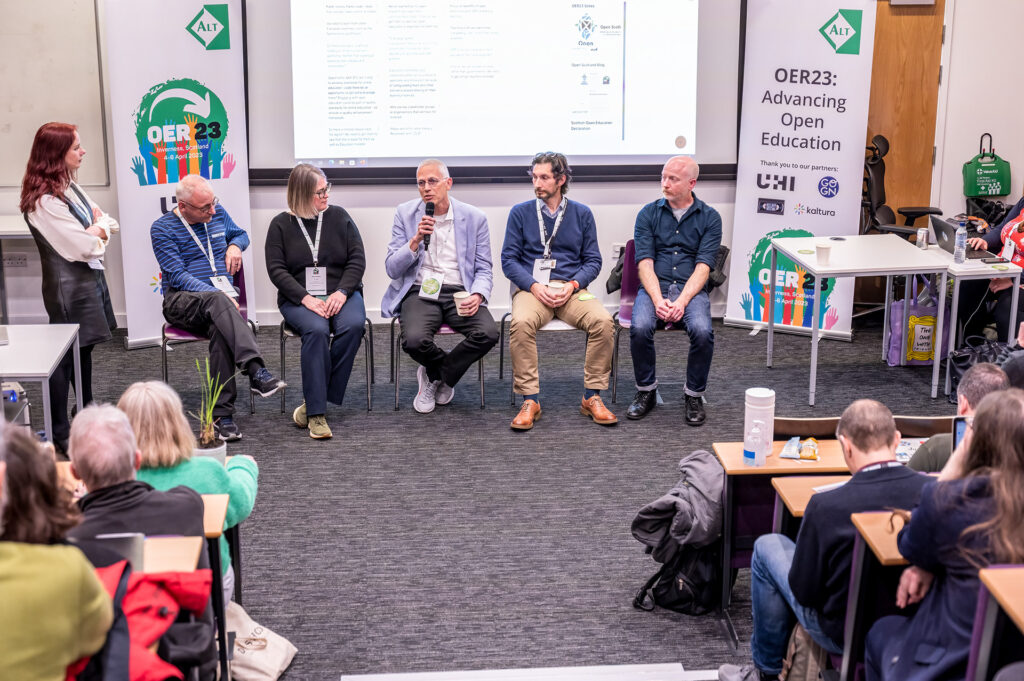
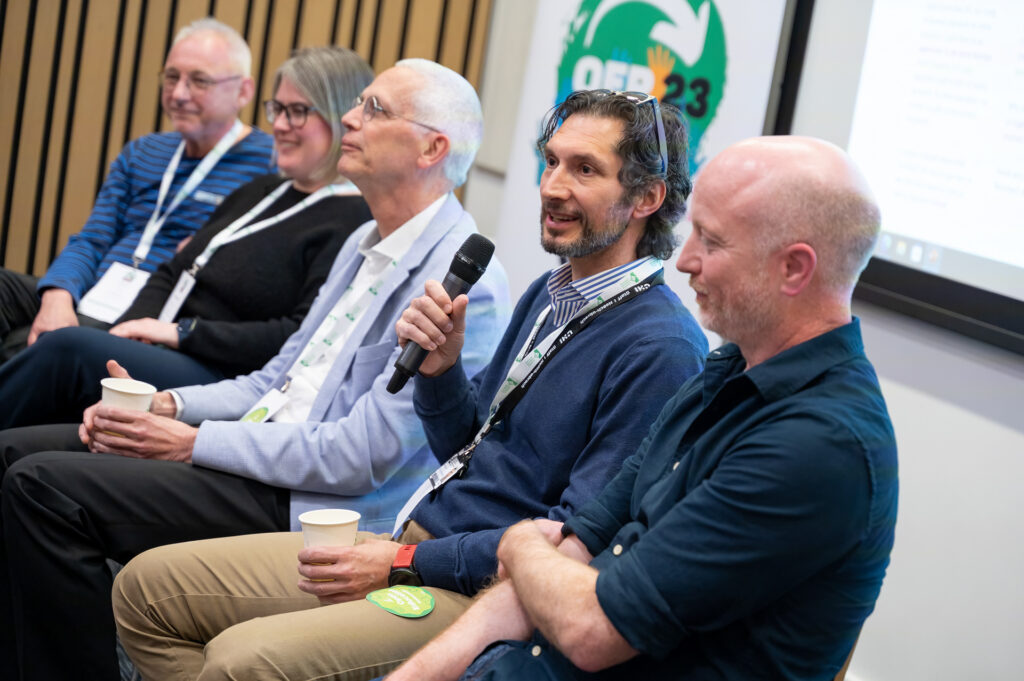
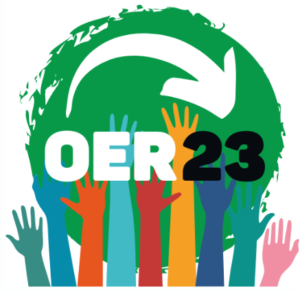 This blog post was originally posted on the
This blog post was originally posted on the 
















 (@celTatis)
(@celTatis)